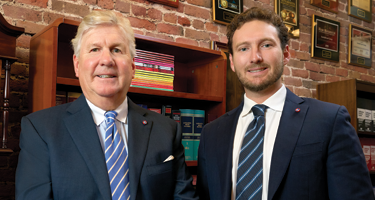Courts in Northern California have continued to hear cases, many of them years-long battles that are still ongoing. Here is a look at some recent court cases in Northern California.
Hart v. Keenan Properties, Inc.
From September 1976 to March 1977, Frank Hart, a former construction worker and contractor based in McKinleyville, California, worked for Keenan Properties, Inc. all across the state. During his time there, Hart bounced between a number of sister companies owned and operated by Keenan, primarily working at the Christeve Corporation in the fabrication and distribution of asbestos based cement pipes. Keenan Properties, Inc. and its sister companies started this practice in 1965 and would eventually cease all asbestos based production in 1983. Decades after leaving Keenan Properties, Inc., Hart began showing signs of respiratory issues. Hart, who was unaware the pipes contained asbestos, eventually developed mesothelioma due to lack of respiratory equipment and repeated exposure to asbestos pipe shavings. In 2016, Hart and his wife formally filed suit against Keenan Properties Inc. for personally injury, negligence and failure to notify workers of the harmful conditions. After the trial concluded, Hart was awarded $4.8 million in personal damages. Currently, Hart is filing suit against the remaining entities stilled owned and operated by Keenan Properties, Inc.
Frlekin v. Apple Inc.
In order to comply with Apple’s exit bag-search policy, all employees working in any one of the 52 California locations must undergo a brief search before leaving their respective store. This policy also applies to Apple’s main campus location in Cupertino, CA, where Amanda Frlekin and her co-workers were employed in 2009. Following the institution of this company policy, Frlekin filed suit against Apple in 2016, claiming they violated California State law by implementing mandatory bag searches as well as withholding overtime wages for her time spent waiting. Clearly stated in Apple’s 2009 “Employee Package and Bag Search Policy,” all employees were required to clock out prior to undergoing the newly mandated bag searches. On multiple occasions, both Frlekin and her co-workers failed to do so, violating Apple’s policy. In 2017, California’s Ninth Circuit Courts denied her claims. Currently, Frlekin is seeking an appeal as well as further compensation from Apple.
Busker v. Wabtec Corporation
In 2010, the California Regional Rail Authority contracted the Parsons Transportation Group to fully design, furnish and install an entirely new statewide communications network called Positive Train Control or PTC. The installation of this PTC system would allow the Rail Authority to more accurately track trains from one centralized hub rather than across a network of multiple, minimizing or even avoiding the future possibility of train collisions via GPS. The Wabtec Corporation, one of many companies subcontracted to work on the $216 million project, primarily focused on the installation of signal components in each train car. John Busker was one of 100 Wabtec employees assigned to the project, working consistently for nearly two full years on electrical onboarding installation. After not receiving additional wages for almost two years, Busker filed a formal prevailing wages complaint against Wabtec with the Division of Labor Standards Enforcement (DLSE). Enacted in 1931, California’s Prevailing Wage Law states, “the overall purpose of prevailing wage is to protect and benefit employees on public works projects from receiving a substandard wage.” The DLSE found Wabtec Corporation guilty of failing to pay their employees prevailing wages and fined them $5.8 million. Currently, Busker is seeking additional compensation for both personal and economic damages accrued since first filing suit back in 2012.
Disclaimer: All above cases summarized from full case documentation on Justia.



















